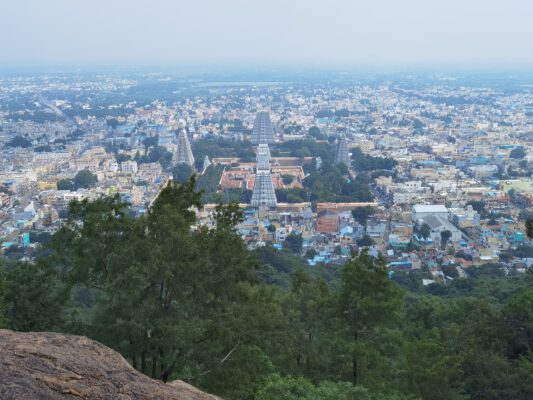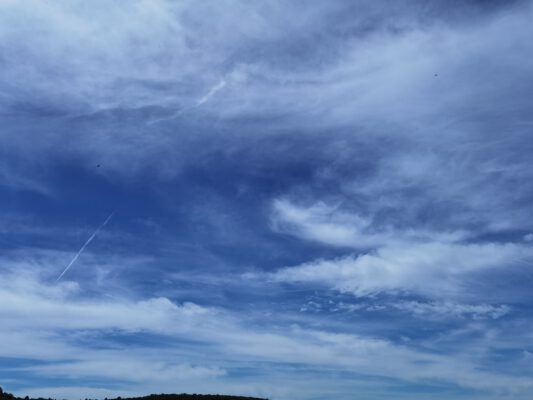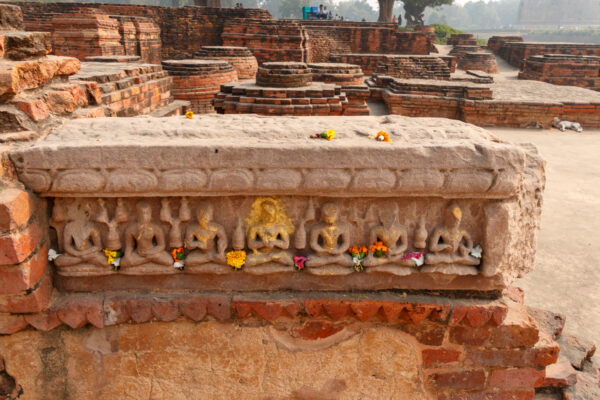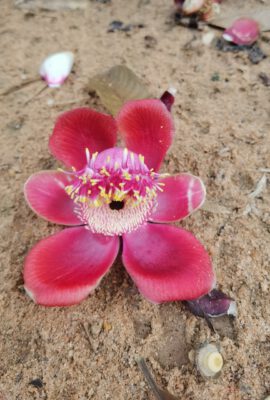Lou read Sri Aurobindo again and again at long intervals. Why not absorb everything much and quickly and finally bring order into my world of thoughts, which wants to break free from the consequences of rational monotheism? Why don't I give my intellect the freedom, concentration, calm and strength to embark on one of life's greatest adventures?
As a student, I once very naively went swimming in the Rhine, somewhere off Basel, where the water was clear and cold, flowing fast and wide through green mountain landscapes. As soon as we jumped into the river, we found ourselves in the middle of the stream. The bank passed by at breakneck speed and we knew we had to get out again quickly, because we had simply gone into the river somewhere and had to find our way back to our clothes somehow. We were excited, alive, reborn. It felt like diving into the river of life. The senses sharpened, the world as a process showed its power in a loving way, the self asserted itself against the five elements. The intellect was quiet, the experience of the sublime great, the breath active. This is one of the images in my memory that helps me to follow the Upanishads.
This experience, like every experience, consists of images. In contact with the outside world, the outer senses convey an inner sense, a perception that can become an experience. This inner sense, mediated by the nerve endings of the outer senses, is fed by the vibration of light, sound, touch, taste and smell. And this inner sense can in turn express itself through sound, gestures and representation. This inner sense is consciousness.
In spiritual philosophy, the world of the inner sense is the world of the subtle in contrast to the world of gross matter. The images that manifest themselves in the subtle reality are real (Schopenhauer and Bergson also recognized this). And just as images of trees and butterflies, people and art, pain and joy manifest themselves in this world, we also find traits of character, personality structures, power constellations, larger contexts that we recognize as images. We ask ourselves why someone does something or why I perceive something in a way that is not good, right or true. We can confide in images that appear to us as illusions; we can perceive the illusion as reality and we can have the feeling of being trapped in something that exceeds our own possibilities of control. So we perceive things that do not correspond to any external object that could have touched my external senses. We can formulate the logic of these images in hypotheses and 'test' them against reality. Consciousness precedes reality. In the past, this world was structured by the gods of the pantheon. Today we pretend that it is science.
Subtle and crude reality
We try to understand the world of gross matter with the help of the natural sciences, although this is actually a euphemism, because the natural sciences are not really concerned with investigating nature, because what constitutes nature is the connection to that subtle reality. So would it be more honest to stick to the narrower concept of empirical science? The science that concentrates on what can be repeatedly experienced? This also seems to be misleading, because many things in the subtle world can indeed be experienced and described empirically. What about the individual sciences such as physics, medicine and sociology? They impose a self-restriction on themselves by concentrating on the material world and deriving general laws from it. These laws of nature in turn describe a deeper reality, a metaphysics. As long as metaphysics excludes consciousness, it is allowed to assume very complex theories and elementary particles, as long as it does not become entangled in contradictions (although this is also often permitted).
What is it that prevents modern science from dealing with consciousness? What has discredited the inner world of experience to such an extent that we do everything we can to deny it? The answer is double-edged. Rationality, which opposes the phenomenology of consciousness, accelerates the applied sciences through its basic research; and in the form of enlightenment, it attempts to critically scrutinize abuses of power. On the other hand, it leaves behind an emptiness that is concealed by consumption and a culture industry of whatever kind, creating a kind of Disneyland (Adorno). The confrontation with spirituality is marginalized and relegated to the realm of the obscure. Are there perhaps good reasons for this? After all, the success of the Enlightenment in the 20th century could not even be halted by the catastrophe of the Holocaust. The exploitation of our environment allowed a feudal lifestyle for the masses in the West. I am not an opponent of progress, but it has its price.
India
How do the fact that 16% of the population in India are malnourished and 97% say they are spiritual fit together? Does one have nothing to do with the other? Is the question a classic category mistake? Is an inwardly enlightened society that owes its prosperity to the exploitation of the global South more successful than a colonized spiritual society whose tolerance of suffering ensured its survival? Can any conclusions be drawn from such polarizing statements? I mention this here to suggest that a question about spirituality and consciousness need not or cannot necessarily be discussed in connection with progress, as this quickly becomes very confusing.
I live here in the south of India, partly in a pre-modern world. The suffering of many is difficult to bear from a modern perspective, religious practice sometimes appears naive, social structures are patriarchal and archaic on the surface, culture is traditionally oriented, knowledge is conservative. I am very aware of my privileged position here and try to avoid romanticizing. Nevertheless, there is something in this world that has been lost in modernity: the integrity of being. Being is not merely the suffering of the individual self and its urge for self-realization, but being is part of cosmic reality, within which the self is part. That this notion can be richer, freer and more self-realized at the end of the day is the power of spiritual thinking that delves into the subtleties of subtle reality.







